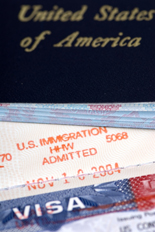US Immigration News |
|||||||
|
|||||||
 |
|||||||
Adoption: Petitioning the Orphan |
|||||||
|
|||||||
|
U.S. immigration laws, specifically, the Immigration and Nationality
Act ("INA"), provides 2 ways for U.S. citizen PAPS to adopt a child
overseas: 1) either the child was previously adopted when the child was under the age of 16 and has already resided with, and in the legal custody of, the adoptive parent(s), for at least two years; or |
|||||||
| SPONSORED LINKS/td> | |||||||
| 2) the child is an orphan as defined under INA. The U.S. Department of State strongly advises U.S. citizens to verify that a particular child will fit into one of these two categories as outlined above before proceeding with an adoption. International adoptions are expensive, time consuming and a large investment of emotions. A consular officer cannot issue a visa to an adopted child if he or she does not meet the legal definitions of 101(b)(1)(E) or 101(b)(1)(F). |
|
||||||
|
With respect to the first option (previously adopted child),
Philippine law adds additional requirements to U.S. laws: 1) a three year residency; and 2) certification of legal capacity to adopt. The Philippine government may waive the additional requirements only if the PAP(S) are either a former Filipino citizen who seeks to adopt a relative within the fourth degree of consanguinity, as defined under Philippine law, a person who seeks to adopt the legitimate son/daughter of his/her Filipino spouse; or a person who is married to a Filipino and who seeks to adopt jointly with his/her spouse a relative within the fourth degree of consanguinity, as defined under Philippine law. If PAPS are not eligible for the waivers outlined above, there is a program in the Philippines through their Philippine Inter-country Adoption Board ("ICAB") where PAPS can adopt a child in the custody and care of the Philippine government. Obviously, the child would not be the relative you may have had in mind. In addition, here in the U.S., there is a voluntary USCIS program called "Orphan Adjudication Status First" to allow PAPS to be able to determine whether the child indeed meets the definition of orphan and will be able to emigrate to the U.S. The Philippines is listed as one of the countries involved in the pilot program. This pilot program was designed to eliminate the unfortunate situations in which individuals adopt children in foreign countries only to find out later that the children are not allowed to immigrate to the US because they are not orphans according to US laws. Keep in mind that this pilot program is strictly voluntary and USCIS may, at any time, cease to offer this process. As most U.S. families cannot meet the two-year residency and custody requirements under INA, this article will focus on the international adoption of an orphan. An orphan is defined under INA as follows: 1) The child must be under the age of 16 at the time an I-600 Petition is filed with the CIS or a consular officer on his or her behalf; 2) The child meets the U.S. immigration law definition of "orphan" because: 1.The child has no parents due to the death or disappearance of, abandonment or desertion by, or separation from or loss of both parents; or 2. The sole or surviving parent is incapable of providing proper care and has, in writing, irrevocably released the child for emigration and adoption; 3) The adopting parents must have completed a full and final adoption of the child or must have legal custody of the child for purposes of emigration and adoption in the U.S.; and 4) The child has been or will be adopted by a married U.S. citizen and spouse jointly, or by an unmarried U.S. citizen at least 25 years of age, with the intent of forming a bona fide parent/child relationship. **See note below. **There are additional requirements under the Philippines' Intercountry Adoptions Act of 1995 - please see http://travel.state.gov/family/adoption/country/country_437.html and / or consult with an adoption attorney. As most questions I receive regarding adoption usually involve adopting a child relative, I will focus on the definition of abandonment. The most common form of proof of abandonment is the parents' unconditional abandonment to an orphanage. USCIS does not consider a child abandoned if the abandonment is temporary, if the parent(s) are attempting to contribute to the child's support, or if the parents otherwise exhibit that they have not terminated their parental rights. So if your sister in the Philippines has asked you to adopt her 7 year old son, that is, your nephew, so that he can have a better life in the U.S., and she plans to follow suit in arriving in the U.S. through an immigrant or nonimmigrant visa with the intention to become his mother once again, USCIS will likely not grant a visa under those circumstances as that will likely be viewed as temporary abandonment. Complete abandonment, however, is not necessary when there is only one surviving parent. I can only think of the many single female parents of children under the age of 16 who do not have the ability to provide proper care to these children, especially if the fathers had long since abandoned or deserted the child, disappeared, or in writing irrevocably released the child for adoption and emigration purposes. Sadly, it is an all too common event in the Philippines that perhaps is a subject for another article. Nonetheless, under these circumstances, the sole parent may surrender the child, citing inability to provide proper care based on local Philippine poverty standards, not U.S. standards. Keep in mind that the mother may not herself surrender the child if: 1) the child has a step-parent, or 2) the child has been legitimated by the father under the laws of the child's residence or domicile, or by the laws of the father's residence or domicile while the child was in custody or the father has not abandoned, deserted the child, disappeared, or irrevocably released the child for adoption and emigration. This is only a brief snapshot of the complex legal process of an international adoption of a Filipino child. It is quite common to go through a reputable, established international adoption agency, and consult with or use the services of an adoption attorney in the U.S. and/or an adoption attorney in the Philippines. If you would like more information regarding adoption in the Philippines of a child in the custody of the government, contact: The Inter-Country Adoption Board P.O. Box 1622 #2 Chicago corner Ermin Garcia Streets, Cubao, Quezon City, Philippines, Tel: (632) 721-9781/82; (632) 726-4551/68 Fax: (632) 727-2026 E-mail: icaba@skyinet.net, Internet: www.skyinet.net/~icaba/ For general information regarding overseas adoptions, the Department of State does provide extensive information about the adoption processes in various countries and the U.S. legal requirements to bring a child adopted abroad to the United States. In addition to this website, The Office of Children's Issues in the Bureau of Consular Affairs provides brochures describing the adoption process in numerous countries. In addition, they provide recorded information on international adoption for several countries on a twenty-four hour basis through our recorded telephone messages at 1-888-407-4747. DOS website is www.state.gov. Sources consulted for this article include Immigration Practice 2006-2007 Edition, Divine, Robert C., Chisam, R. Blake (published 2006), INA and its accompanying regulations, USCIS Memo of W. Yates (June 4, 2003) posted at USCIS "policy memo" webpage, www.state.gov, www.adoption.com, and www.uscis.gov. |
|||||||
|
|||||||
|
Terms of Use.†Privacy Policy. Disclaimer.
|







